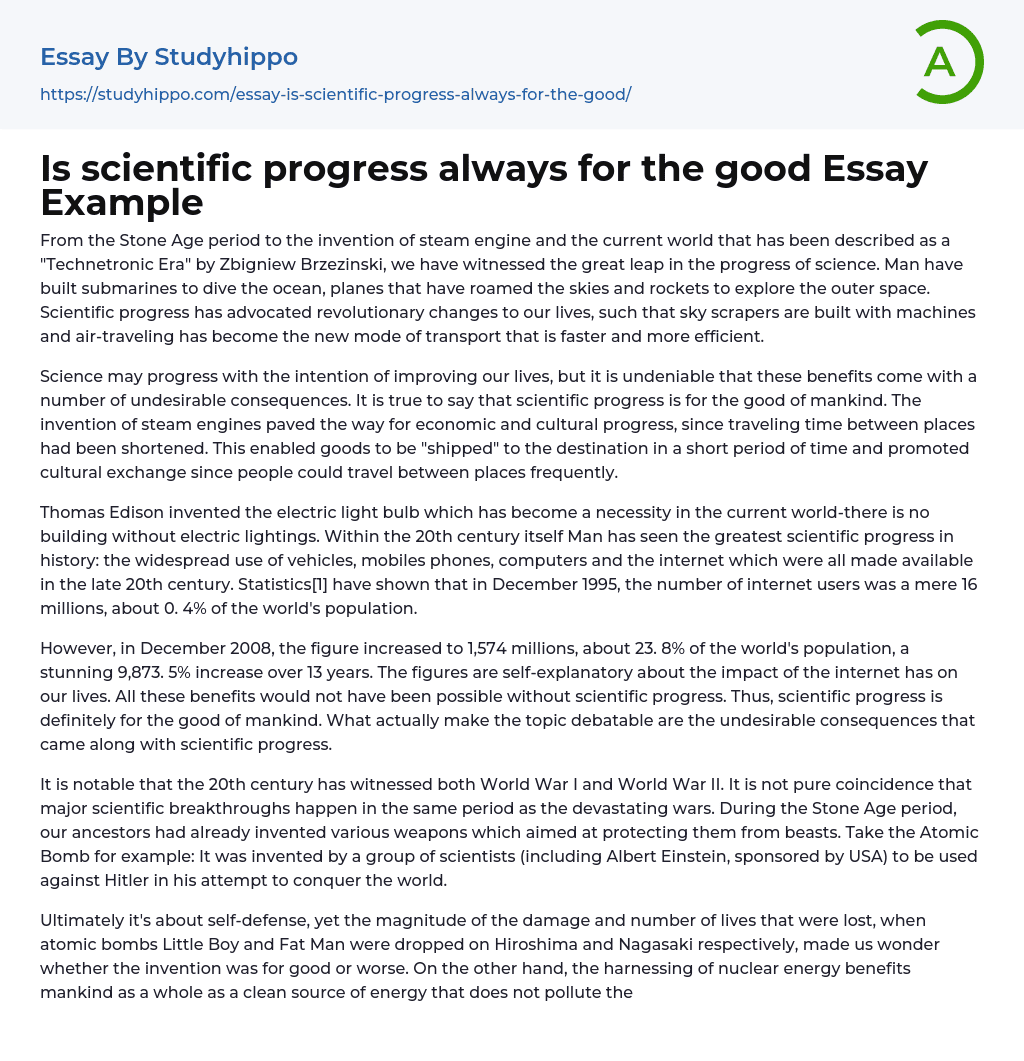From the Stone Age period to the invention of steam engine and the current world that has been described as a "Technetronic Era" by Zbigniew Brzezinski, we have witnessed the great leap in the progress of science. Man have built submarines to dive the ocean, planes that have roamed the skies and rockets to explore the outer space. Scientific progress has advocated revolutionary changes to our lives, such that sky scrapers are built with machines and air-traveling has become the new mode of transport that is faster and more efficient.
Science may progress with the intention of improving our lives, but it is undeniable that these benefits come with a number of undesirable consequences. It is true to say that scientific progress is for the good of mankind. The invention of steam engines paved the way for economic and cultural progress, since trave
...ling time between places had been shortened. This enabled goods to be "shipped" to the destination in a short period of time and promoted cultural exchange since people could travel between places frequently.
Thomas Edison invented the electric light bulb which has become a necessity in the current world-there is no building without electric lightings. Within the 20th century itself Man has seen the greatest scientific progress in history: the widespread use of vehicles, mobiles phones, computers and the internet which were all made available in the late 20th century. Statistics[1] have shown that in December 1995, the number of internet users was a mere 16 millions, about 0. 4% of the world's population.
However, in December 2008, the figure increased to 1,574 millions, about 23. 8% of the world's population, a stunning 9,873. 5% increase
over 13 years. The figures are self-explanatory about the impact of the internet has on our lives. All these benefits would not have been possible without scientific progress. Thus, scientific progress is definitely for the good of mankind. What actually make the topic debatable are the undesirable consequences that came along with scientific progress.
It is notable that the 20th century has witnessed both World War I and World War II. It is not pure coincidence that major scientific breakthroughs happen in the same period as the devastating wars. During the Stone Age period, our ancestors had already invented various weapons which aimed at protecting them from beasts. Take the Atomic Bomb for example: It was invented by a group of scientists (including Albert Einstein, sponsored by USA) to be used against Hitler in his attempt to conquer the world.
Ultimately it's about self-defense, yet the magnitude of the damage and number of lives that were lost, when atomic bombs Little Boy and Fat Man were dropped on Hiroshima and Nagasaki respectively, made us wonder whether the invention was for good or worse. On the other hand, the harnessing of nuclear energy benefits mankind as a whole as a clean source of energy that does not pollute the environment is just what we need at the moment. Both nuclear energy and nuclear bombs use the same principles in Physics, but they serve different purposes.
The point is that all of these boil down to us, humans. Scientific progress is essentially for the greater good of mankind, but it is a double-edged sword. The decision of whether it should benefit or destroy humanity lies in our hand. Another problem
that surfaces whenever scientific progress is concerned is the issue on over reliance, a theme which is often employed in Sci-Fi movies such as Wall E and I-Robot. People tend to rely on technology too much that they cannot do without it.
Consider the present day scenarios where e-banking, e-learning and the stock markets revolve around the internet. If one day the network was to be disabled for whatever reason, our stock markets would crash and an economy recession would follow. Gadgets such as mobile phones and i-Pods have become necessities in the modern world. Over-reliance on technology will cause mankind to lose their way of thinking and problem solving skills since everything can be resolved with just a click of the mouse.
Thus, scientific progress may provide us with better lives, but cost us our survival instincts. Regardless of how humans have handicapped themselves due to over reliance on technology or how technology is used in war and cost lives, there is no doubt that scientific progress has brought about positive changes in our lives, such as the invention of air-conditioners and the discovery of Penicillin. While scientific progress may not always serve the "good" purpose, it is definitely for the common good of all mankind.
- Bacteria essays
- Biotechnology essays
- Breeding essays
- Cell essays
- Cell Membrane essays
- Cystic Fibrosis essays
- Enzyme essays
- Human essays
- Microbiology essays
- Natural Selection essays
- Photosynthesis essays
- Plant essays
- Protein essays
- Stem Cell essays
- Viruses essays
- American Civil War essays
- Atomic Bomb essays
- Attack essays
- Cold War essays
- Crimean War essays
- Diplomacy essays
- Emilio Aguinaldo essays
- Emperor essays
- Hitler essays
- Iraq War essays
- Korean War essays
- Mexican American War essays
- Nazism essays
- Nuclear Weapon essays
- Philippine Revolution essays
- Revolutionary War essays
- Rwanda essays
- The Spanish American War essays
- Trench Warfare essays
- Tribe essays
- Vietnam War essays
- War of 1812 essays
- Western Front essays
- World War I essays
- World War Ii essays
- Agriculture essays
- Albert einstein essays
- Animals essays
- Archaeology essays
- Bear essays
- Biology essays
- Birds essays
- Butterfly essays
- Cat essays
- Charles Darwin essays




